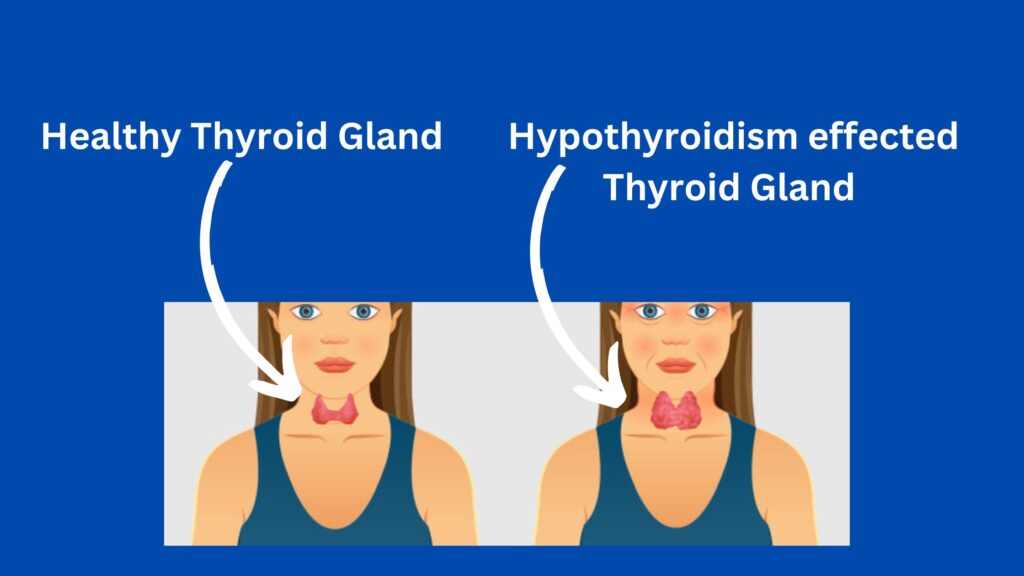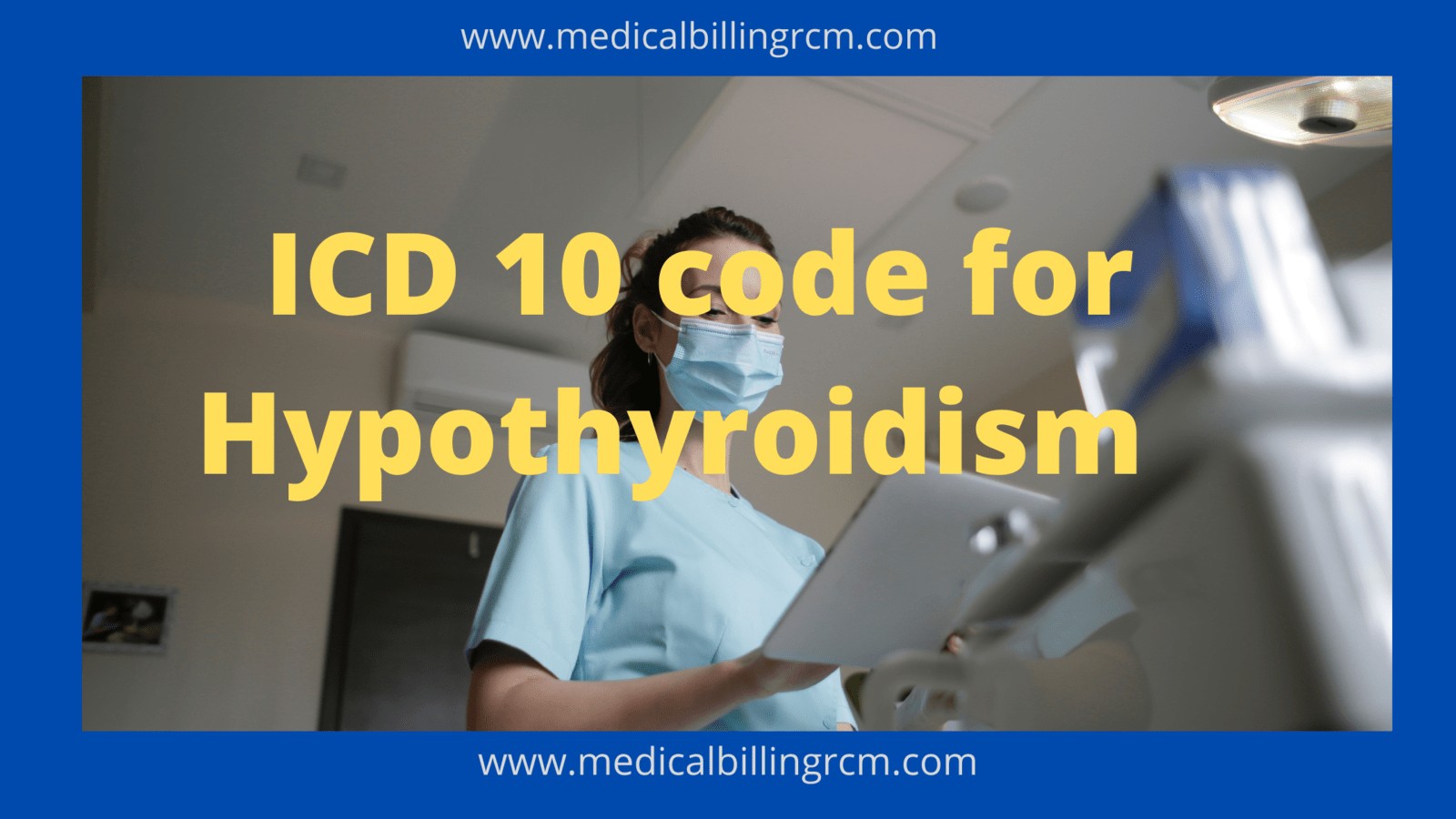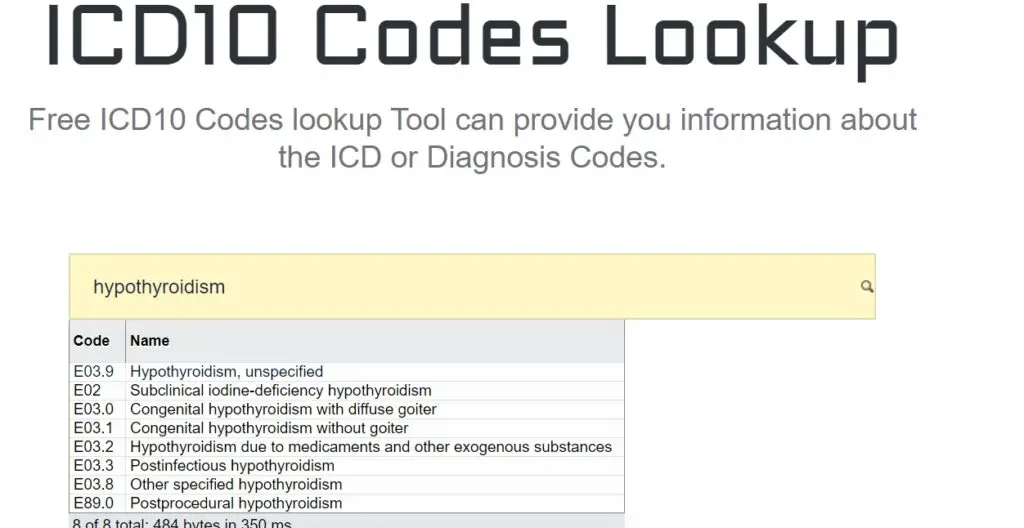The ICD 10 code is used by doctors to document problems like Hypothyroidism. The hypothyroidism ICD 10 Code is used to indicate a diagnosis of hypothyroidism listed by the World Health Organization under a range of Endocrine, nutritional and metabolic diseases. ICD 10 Code For Hypothyroidism is E03. 9 for unspecified and E03.8 for specified hypothyroidism.
In the medical world, different codes are used for different diseases. The ICD-10 code E03 is used for hypothyroidism. Hypothyroidism is a medical condition or disease where the thyroid gland fails to produce enough hormones for the body to function smoothly. ICD 10 code The most common causes of hypothyroidism are autoimmune diseases (Hashimoto’s thyroiditis).
ICD 10 code for hypothyroidism is E03. The full code is E03.0, which stands for “primary hypothyroidism.” This code is used to describe a condition in which the thyroid gland does not produce enough hormones, resulting in decreased metabolism and a wide range of symptoms, including fatigue, weight gain, cold intolerance, and Depression included.
ICD 10 Code For Hypothyroidism
Hypothyroidism ICD 10 codes with other related diagnosis codes mentioned as below
E01.2 – Unspecified Iodine-deficiency related (endemic) goiter:
- This code is used to indicate a goiter, which is an enlarged thyroid gland, that is related to a deficiency of iodine in the diet. It’s unspecified, meaning the specific cause or details of the goiter are not provided.
E01.8 – Other iodine-deficiency related thyroid disorders and allied conditions:
- This code covers various thyroid disorders and related conditions that result from a deficiency of iodine. It encompasses a range of conditions beyond just goiter.
E02 – Subclinical iodine-deficiency hypothyroidism:
- This code is used when a person has a mild form of hypothyroidism (underactive thyroid) that is related to iodine deficiency. “Subclinical” means that the condition is present but doesn’t have noticeable symptoms.
E03 – Other hypothyroidism:
- This category includes various forms of hypothyroidism (underactive thyroid) that are not specifically related to iodine deficiency. It covers a range of causes and types of hypothyroidism.
E03.0 – Congenital hypothyroidism with diffuse goiter:
- This code is for congenital (present at birth) hypothyroidism where the thyroid gland is enlarged (diffuse goiter).
E03.1 – Congenital hypothyroidism without goiter:
- Similar to the previous code, this is for congenital hypothyroidism but without an enlarged thyroid gland (no goiter).
E03.2 – Hypothyroidism due to medicaments and other exogenous substances:
- This code is used when hypothyroidism is caused by medications or external substances, such as certain drugs or toxins.
E03.3 – Postinfectious hypothyroidism:
- This code indicates hypothyroidism that develops after an infection.
E03.4 – Atrophy of thyroid (acquired):
- This code is used when the thyroid gland has shrunk or atrophied due to various causes.
E03.5 – Myxedema coma:
- This code represents a severe and life-threatening form of hypothyroidism known as myxedema coma, which is a medical emergency.
E03.8 – Other specified hypothyroidism:
- This code covers specific types or causes of hypothyroidism that are not included in the previous categories.
E03.9 – Hypothyroidism, unspecified:
- This code is used when the exact type or cause of hypothyroidism is not specified or known.
E04 – Other nontoxic goiter:
- This category encompasses various forms of goiter (enlarged thyroid gland) that are not caused by toxicity.
E04.0 – Nontoxic diffuse goiter:
- This code is for a non-toxic goiter where the entire thyroid gland is enlarged.
E04.1 – Nontoxic single thyroid nodule:
- This code is used when a single nodule or lump forms in the thyroid gland without any toxic effects.
E04.2 – Nontoxic multinodular goiter:
- This code is used when there are multiple nodules or lumps in the thyroid gland without any toxic effects.
E04.8 – Other specified nontoxic goiter:
- This code covers specific types or causes of non-toxic goiter that are not included in the previous categories.
E04.9 – Nontoxic goiter, unspecified:
- This code is used when the exact type or cause of a non-toxic goiter is not specified or known.
E05 – Thyrotoxicosis [hyperthyroidism]:
- This category covers various forms of hyperthyroidism, where the thyroid gland is overactive and produces too much thyroid hormone.
E05.0 – Thyrotoxicosis with diffuse goiter:
- This code is used when hyperthyroidism is accompanied by an enlarged thyroid gland.
E05.00 – Without thyrotoxic crisis or storm:
- This modifier specifies that the hyperthyroidism is not in a crisis or storm state, which are severe and life-threatening conditions associated with hyperthyroidism.
These codes are used by healthcare professionals to accurately document and categorize thyroid-related disorders and conditions for medical record-keeping and billing purposes.
For check other ICD10 Codes please visit,
Please note that these descriptions are for informational and educational purposes only and are not a substitute for professional medical advice. Consult a qualified healthcare provider for proper evaluation and treatment if you have concerns about your health or specific medical conditions.
| Do you know? ICD-10 coding is one of the most challenging to master where even most medical coding experts fail. The code’s expanded specificity and ability to capture nationally reportable public health diseases necessitates the requirement of an expert medical coding agency. Fortunately, BellMedex medical coding company has the professional level expertise to deal with ICD-10 codes and remediate the failures your clinic might be stuck at. A claim approval rate of 98% means on-time reimbursements and smooth revenue flow for your practice. Let BellMedex Claim Examiners Do The ICD-10 Code Submission |
What is Hypothyroidism?
Hypothyroidism is a common and lifelong health condition that cannot be prevented. It can basically be defined as the situation where the thyroid gland does not produce enough hormones for maintaining good health.
Hypothyroidism is a condition in which the thyroid gland stops producing enough hormones to regulate metabolism in the body. This can result in a range of symptoms including fatigue, weight gain, cold intolerance, constipation, depression and dry skin. icd 10 code for hypothyroidism is used, it can be caused by autoimmune diseases such as Hashimoto’s thyroiditis, radiation therapy, surgery to remove the thyroid gland, and certain medications. Although in some cases, the cause may be unknown.
Hypothyroidism is usually diagnosed through a blood test that measures levels of thyroid hormones and thyroid-stimulating hormone (TSH). Treatment involves taking daily hormone replacement therapy in the form of levothyroxine, which is a synthetic form of the thyroid hormone thyroxine. It is diagnosed under icd 10 code for hypothyroidism.
These hormones that are released by the thyroid gland help in regulating the body and providing energy to almost every organ present in the body.
Besides that, it also promotes the health of the heart and the working of the digestive system. Hypothyroidism is caused due to Hashimoto’s Thyroiditis which is an autoimmune condition.
The risk of hypothyroidism is higher in women and people who are 60 years of age, can go under such health hazards. Even the ones with a family history of hypothyroidism or who are going through any kind of autoimmune conditions like type 1 diabetes are likely to get hypothyroidism as well.

What causes Hypothyroidism?
ICD 10 code hypothyroidism is a condition characterized by an underactive thyroid gland, which results in reduced or stopped production of thyroid hormones. There are many causes of hypothyroidism, including:
● Autoimmune disorders:- The most common cause of hypothyroidism is Hashimoto’s thyroiditis, an autoimmune disorder that occurs when the immune system attacks and destroys the thyroid gland.
●Iodine Deficiency:- Iodine is an essential component of thyroid hormones, and iodine deficiency can lead to hypothyroidism.
● Thyroid surgery:- Surgical removal of the thyroid gland for the treatment of thyroid cancer can lead to hypothyroidism.
●Radiation therapy: Radiation therapy to the neck and head, such as for cancer treatment, can damage the thyroid gland and cause hypothyroidism.
●Certain medications: Some medications, such as lithium and amiodarone, can interfere with the production of thyroid hormones and cause hypothyroidism.
What Complications One Might Suffer in Hypothyroidism?
If a person develops hypothyroidism then chances are that the person will suffer from the complications that are mentioned below.
- Balance problems
- Goiter
- Heart problems
- Infertility
- Joint pains
- Mental illness
- Obesity and
- Peripheral neuropathy
If a pregnant lady suffers from hypothyroidism then the chances of affecting the baby in different ways are high. It is possible that the child can be born with undeveloped mental health.
What are the Common Signs of Hypothyroidism?
The signs of hypothyroidism can vary from one person to another where the early symptoms can include gaining weight and fatigue. Other than that, some of the common signs of hypothyroidism include,
- Fatigue
- Sensitive face
- Depression
- Constipation
- Weight gain
- Feeling cold
- Less sweating
- Reduced heart rate
- Dry skin and hair
- Menstrual problems
- Problems with Fertility
- Pain in joints
- Weakness in muscles and more
Hypothyroidism is a condition where the thyroid gland does not produce enough hormones, causing the body’s metabolism to slow down. The six common symptoms of hypothyroidism are as follows:
● Feeling tired with light exertion:- People with hypothyroidism often feel tired and have low energy levels, even after getting enough sleep.
● Persistent weight gain :- A slow metabolism can cause weight gain, even if the person’s diet and activity level remain unchanged.
● Cold intolerance: People with hypothyroidism feel cold even in hot weather. Or in addition their tolerance to cold temperatures may be reduced.
● Dry skin :- The skin may become dry, rough and flaky and the hair may become brittle and dull.
● Symptoms of constipation: – In hypothyroidism, the digestive system slows down, due to which constipation occurs.
Depression: Hypothyroidism can cause a persistent feeling of sadness and fatigue, which can lead to depression and lead to depression.
Sometimes the symptoms are hard to find but they might get easily identified as the thyroid slows down. Though the problem is lifelong it can be maintained if treated properly and through regular medication help.
The main aim of the treatment for hypothyroidism includes reduction and normalization in the production of thyroid hormones. Make sure that you take the medications regularly as prescribed by the doctor to avoid the complications from coming back again.
How to protect ourself from Hypothyroidism?
ICD 10 code that represents Hypothyroidism can be caused by a number of factors, including genetics, autoimmune disorders, and radiation exposure. To protect yourself, you can take the following steps:
●Maintain a healthy diet:– Eating a balanced diet that includes foods rich in iodine, such as seafood and dairy products, can help keep your thyroid healthy.
●Manage stress:– Chronic stress can impact thyroid function, so it’s important to find healthy ways to manage stress levels, such as exercise, meditation, or therapy.
●Avoid exposure to radiation:– Limit your exposure to radiation from medical procedures, such as X-rays, as well as environmental sources like nuclear power plants.
●Know your family history :–If you have a family history of hypothyroidism, be sure to talk to your doctor about your risk and what you can do to monitor your thyroid function.
●Get regular check-ups :– Regular medical check-ups can help detect thyroid problems early, when they’re easiest to treat.
What are the 5 risk factors for hypothyroidism?
There are many risk factors for hypothyroidism, including:
● Women over the age of 60 are more likely to develop hypothyroidism.
● People with a family history of thyroid disease are at higher risk.
● Exposure to radiation, such as from X-rays or radiation therapy, can increase the risk of developing hypothyroidism.
● People whose thyroid gland has been removed or damaged are at higher risk of hypothyroidism.
● People with autoimmune diseases, such as type 1 diabetes or lupus, are at increased risk of hypothyroidism.
What is Hypothyroidism Hereditary?
Hypothyroidism is a condition in which the thyroid gland does not produce enough hormones. While this may be due to environmental factors, it may also have a genetic component. Family history and certain genetic mutations can increase the risk of developing icd 10 code hypothyroidism. However, it is not always inherited and can occur in people without a family history of the condition.
Frequently Asked Questions:
Ans. The ICD-10 code for Thyroid-Stimulating Hormone (TSH) measurement is R94.5. It is used to describe elevated TSH levels in the blood, which can indicate an underactive thyroid (hypothyroidism). The ICD-10 code is used in medical billing and coding to accurately record and categorize a patient’s diagnosis for insurance and medical records purposes.
Ans. Thyroid hormone is a hormone produced by the thyroid gland that regulates metabolism and plays a crucial role in growth and development. It is composed of thyroxine (T4) and triiodothyronine (T3) and helps control the body’s heart rate, body temperature, and energy levels. An imbalance of thyroid hormone can cause health problems such as hypothyroidism (underactive thyroid) or hyperthyroidism (overactive thyroid).
Ans. In the International Classification of Diseases (ICD-10), the codes used to represent abnormal thyroid conditions include:
E00-E07: Thyroid disorders due to iodine deficiency and metabolic imbalances
●E00-E02: Congenital iodine-deficiency syndrome
●E03: Other hypothyroidism
●E04: Non-toxic goiter
●E05: Thyrotoxicosis [hyperthyroidism]
●E06: Thyroiditis
●E07: Other disorders of the thyroid gland
Ans. Yes, untreated hyperthyroidism can lead to serious health complications and potentially cause death if not properly managed. Complications can include heart problems, osteoporosis, and psychosis. Timely diagnosis and treatment is important to prevent these severe outcomes.
Conclusion:
Hypothyroidism ICD 10 , also known as underactive thyroid, is a condition in which the thyroid gland is not producing enough hormones to meet the body’s needs. This can cause a variety of symptoms, including fatigue, weight gain, etc. In this article, we have discussed in detail about ICD 10 code for hypothyroidism.
In medical billing and coding, hypothyroidism is classified using the International Classification of Diseases, 10th Revision (ICD-10) code E03. The specific code used depends on the underlying cause of hypothyroidism as well as any associated conditions that may be present. For example, code E03.0 is used for primary hypothyroidism, while E03.1 is used for hypothyroidism secondary to pituitary or hypothalamic disease.
Through today’s post, we have tried to touch almost all the aspects of hypothyroidism. We have discussed all these topics in detail, what is hypothyroidism and what causes it, how it can be treated and how to protect yourself from hypothyroidism. It is important to seek medical attention if you experience symptoms of hypothyroidism, such as fatigue, weight gain, cold intolerance and constipation, should you consult a doctor.
ICD 10 code for hypothyroidism are updated from the authorized source of information as https://www.unboundmedicine.com/ and https://www.aapc.com/ , for more details also visit these websites.
Related Articles:
- New ICD-10-CM Covid-19 Codes Apply from 1-JAN-21
- ICD 10 Code for Radiculopathy
- Alcohol Withdrawal ICD 10
- ICD Code 10 For Suture Removal
- Gestational Diabetes icd-10
- ICD-10 for Osteoporosis
- ICD 10 Code for Obesity – E66
- Hyperlipidemia ICD 10 Code (2026)
- ICD 10 Code For Low Back Pain
- ICD 10 For GERD and CPT
The author and contributor of this blog "NSingh" is working in Medical Billing and Coding since 2010. He is MBA in marketing and Having vaste experience in different scopes of Medical Billing and Coding as AR-Follow-up, Payment Posting, Charge posting, Coding, etc.


